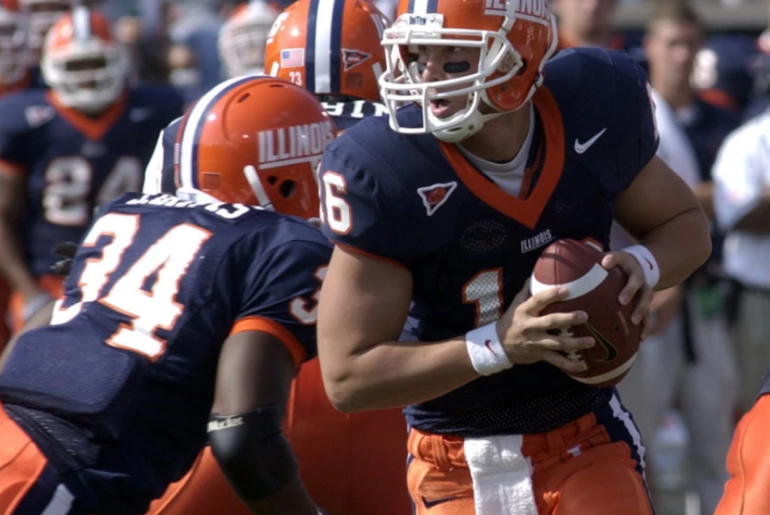In a perplexing yet somewhat predictable narrative twist, Christopher Pazan, a former University of Illinois quarterback turned Chicago police officer, finds himself switching fields—from the football variety to the legal—and facing allegations that have left many spectators puzzled. The plot centers on an incident that transpired unassumingly in a suburban store where the currency exchanged wasn’t grins for satisfied customers but rather disbelief for law enforcement.
On an unremarkable Wednesday afternoon, the drama unfolded at a Meijer store located on South Western Avenue in Evergreen Park, where the star of our tale, Pazan, was reportedly caught in what some might call a rookie mistake. He allegedly attempted to exit the store with approximately $300 worth of baseball cards nestled covertly within a yard waste bag he did pay for, neglecting, however, to settle the score for the cards that pale in comparison to a quarterback’s salary. Security footage, according to Sgt. Victor Watts of the Evergreen Park Police, was less forgiving than a friendly sports referee, catching him in action. Consequently, Pazan found himself on the defensive, this time not on the gridiron but before the gavel.
His current employer, the Chicago Police Department—a team he joined back in 2015—responded like a well-oiled defensive unit by stripping him of his police powers temporarily while an internal investigation plays out. This leaves Pazan, whose duties included tackling cases like arson and financial crimes, in an ironic sideline of his own making.
Pazan’s history of balancing ambition and service began well before this fateful shopping trip. His quarterback days at Brother Rice High School saw him earning all-American honors, leading to a rather brief yet noteworthy college football stint under the University of Illinois’s tutelage. Coaching at his alma mater and St. Joseph’s College soon followed like inevitable postseason appearances. However, the transition from calling plays on the field to donning the badge marked a new chapter, as he once told the Chicago Tribune—a shift to serve in a “different capacity.”
Away from the football field and crime scenes, his personal life has mirrored a complicated playbook. Financial strife is seeping through the seams of his life, reminiscent of shaky defense lines. Earning an annual salary of $111,804, Pazan finds himself waylaid by financial troubles that have plagued him like a season-long injury. Amid a divorce, he is also haunted by unresolved debts, including hefty sums owed to former attorneys, which make it poignant that his arrest coincided with a court date.
Pazan’s chronicles are encumbered by more than misdemeanor theft charges. His past financial missteps include unpaid loans and dismissed suits—court-stories that might read similarly on the bench as a fellow referees a close call at third base. His refinancing attempts hint at an attempt to regain financial footing reminiscent of a quarterback regaining composure for a successful Hail Mary pass. Yet, shadows of previous monetary misjudgments linger, marking him with phrases like “more than $15,000” owed to the likes of JPMorgan Chase.
The Chicago Police Department’s hiring policy, keen to block recruits with inordinate debt from their ranks to preserve integrity, leaves one to wonder how Pazan initially scored a position. His case adds depth to possible revisions in selection procedures. Despite the low label of a misdemeanor charge for retail theft, the implications for Pazan are not without gravity. A court date set for June 23 in Bridgeview looms where his next play will unfold—potentially less dramatic than dodging a linebacker but perhaps even more consequential for his future.
The unfolding drama of Christopher Pazan—a juxtaposition of professional promise and personal pitfalls—serves as a cautionary tale. His journey through fields of glory and security turns now to a legal terrain where understanding, reformation, or redress might play out as needed touchdowns or sackings. He stands just as much a figure of intrigue as his storied, tangible pursuit of stolen baseball cards.

